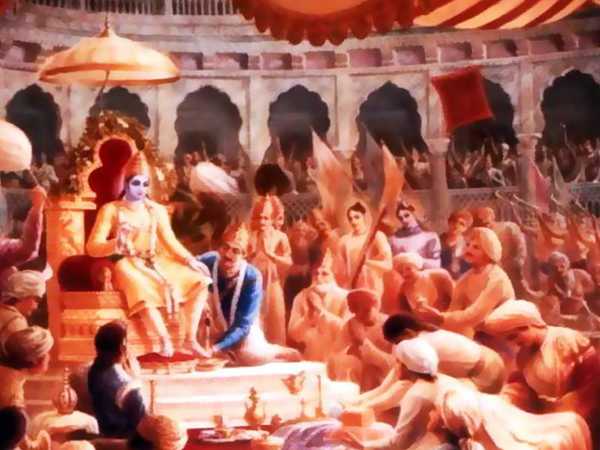Chapter 34

“Sauti said, ‘Hearing this story of the re-appearance and departure ofhis forefathers, king Janamejaya of great intelligence became highlypleased. Filled with joy, he once more questioned Vaisampayana on thesubject of the reappearance of dead men, saying,–“How is it possible forpersons whose bodies have been destroyed to re-appear in those veryforms?” Thus asked, that foremost of regenerate persons, viz., thedisciple of Vyasa, that first of speakers, possessed of great energy,thus answered Janamejaya.
“Vaisampayana said, ‘This is certain, viz., that acts are never destroyed(without their consequences being enjoyed or endured). Bodies, O king,are born of acts; so also are features. The great primal elements areeternal (indestructible) in consequence of the union with them of theLord of all beings. They exist with what is eternal. Accordingly, theyhave no destruction when the non-eternal are destroyed. Acts done withoutexertion are true and foremost, and bear real fruit. The soul, unitedhowever with such acts as require exertion for their accomplishment,enjoys pleasure and pain.[50] Though united so (that is, with pleasureand pain), yet it is a certain inference that the soul is never modifiedby them, like the reflection of creatures in a mirror. It is neverdestroyed.[51] As long as one’s acts are not exhausted (by enjoyment orendurance of their fruits good and bad), so long does one regard the bodyto be oneself. The man, however, whose acts have been exhausted, withoutregarding the body to be self, takes the self to be somethingotherwise.[52] Diverse existent objects (such as the primal elements andthe senses, etc.) attaining to a body, become united as one. To men ofknowledge who understand the difference (between the body and self),those very objects become eternal.[53] In the Horse-sacrifice, this Srutiis heard in the matter of the slaying of the horse. Those which are thecertain possessions of embodied creatures, viz., their life-breaths (andthe senses, etc.), exist eternally even when they are borne to the otherworld. I shall tell thee what is beneficial, if it be agreeable to thee,O king. Thou hast, while employed in thy sacrifices, heard of the pathsof the deities. When preparations were made for any sacrifice of thine,the deities became beneficially inclined to thee. When indeed, thedeities were thus disposed and came to thy sacrifices, they were lords inthe matter of the passage (from this to the next world) of the animalsslain.[54] For this reason, the eternal ones (viz., Jivas), by adoringthe deities in sacrifices, succeed in attaining to excellent goals. Whenthe five primal elements are eternal, when the soul also is eternal, hecalled Purusha (viz., the soul invested with case) is equally so. Whensuch is the case, he who beholds a creature as disposed to take diverseforms, is regarded as having an erroneous understanding. He who indulgesin too much grief at separation is, I think, a foolish person. He whosees evil in separation should abandon union. By standing aloof, nounions are formed, and sorrow is cast off, for sorrow in the world isborn of separation.[55] Only he who understands the distinction betweenbody and self, and not another, becomes freed from the erroneousconviction. He that knows the other (viz., self) attains to the highestunderstanding and becomes freed from error.[56] As regards creatures.they appear from an invisible state, and once more disappear intoinvisibleness. I do not know him. He also does not know me. As regardsmyself, renunciation is not yet mine.[57] He that is not possessed ofpuissance enjoys or endures the fruits of all his acts in those too diesin which he does them. If the act be a mental one, its consequences areenjoyed or endured mentally; if it be done with the body, itsconsequences are to be enjoyed or endured in the body.'”[58]




